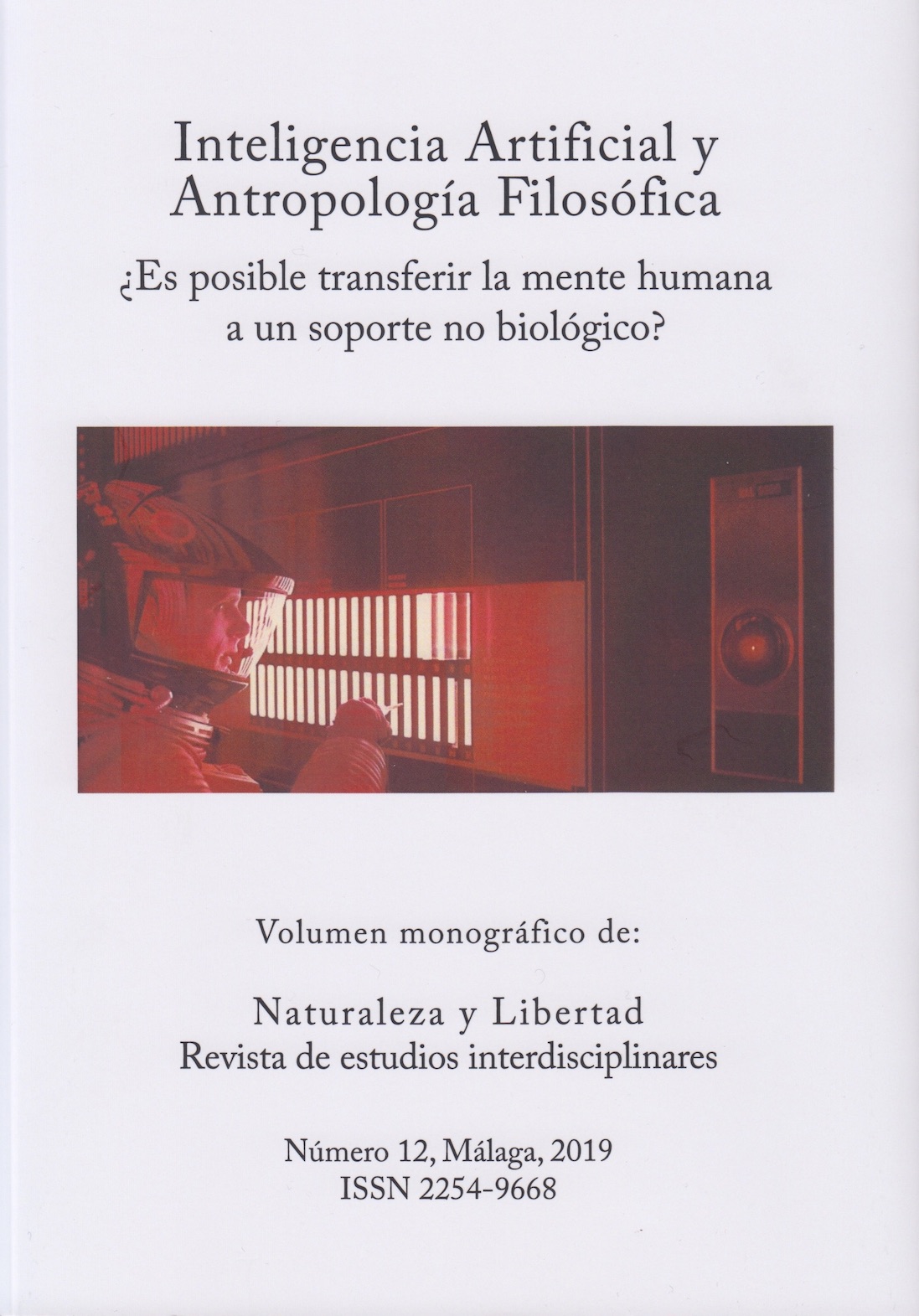Inteligencia artificial: la cibernética del ser vivo y de la máquina
DOI:
https://doi.org/10.24310/NATyLIB.2019.v0i12.6262Keywords:
Inteligencia Humana, Inteligencia artificial, Cibernética, Tecnología, Teoría del Conocimiento, Ontología, Filosofía de la Naturaleza, Aristóteles, Jacinto Choza,Abstract
La complejidad de los sistemas informáticos actuales y la sofisticación a la que se ha llegado con los ordenadores nos sorprende cada vez más. Hoy día se ofrece una alta automatización en el tratamiento de datos y en la elaboración de cálculos lógico-matemáticos de procesos complejos. Esto ha persuadido a muchas personas acerca de la posibilidad de que los ordenadores puedan realmente pensar o que un dispositivo digital sustituya al cerebro. Sin embargo, hay diferencias radicales que se observan entre el pensamiento humano y el procesamiento de datos del ordenador. Me gustaría analizar cuáles son esas diferenciasDownloads
Metrics
References
M. Acosta, “IA: singularidad tecnológica y antropomorfismo”, en: Ideas 12. Sobre Inteligencia Artificial, ¿Conciencia Artificial?, de Natalia López Moratalla, 2018: 103-120.
Aristóteles, Metafísica de Aristóteles, Barcelona, Gredos, 1982, Traductor Valentín García Yebra.
Ch. Barnatt, Digital Genesis. The Future of Computing, Robots and AI, (2017), Publisher
Explaining Computers.com.
J. Brandon, “An AI god will emerge by 2042 and write its own bible. Will you worship it?” Ver: https://venturebeat.com/2017/10/02/an-ai-god-will-emerge-by-2042-and-write-itsown-bible-will-you-worship-it/. (Última visita: 14 julio 2018)
J. Cruz Cruz, Intelecto y razón. Las coordenadas del pensamiento clásico, Pamplona, EUNSA, 1994.
J. Choza, Manual de Antropología Filosófica, Madrid, Rialp, 1988. Stanford University Webpage: https://ai100.stanford.edu/ (Última visita: 14 julio 2018).
Magnet.com. Ver: https://magnet.xataka.com/preguntas-no-tan-frecuentes/ias-no-tevan-quitar-trabajo-granjas-bots-humanos-descubiertas-escandalo-gmail (Última visita: 17 julio 2018).
R. Jordana Butticaz, La ciencia en el horizonte de una razón ampliada. La evolución y el hombre a la luz de las ciencias biológicas y metabiológicas, Madrid, Unión Editorial,
N. Jouve, Explorando los genes. Del Big-Bang a la nueva biología, Madrid, Ediciones Encuentro, 2008.
R. Kurzweil, The Singularity Is Near. When Humans Transcend Biology, New York, VikingPenguin Group, 2005.
P. McCorduck, Machines Who Think: A Personal Inquiry into the History and Prospects of Artificial Intelligence (2004), Natick (MA), A. K. Peters, Ltd.
Th. Nagel, La mente y el cosmos. Por qué la concepción neo-darwinista materialista de la naturaleza es, casi con certeza, falsa, Madrid, Biblioteca Nueva, 2014. Traducción y prólogo: Francisco Rodríguez Valls.
N.J. Nilsson, The Quest for Artificial Intelligence. A History of Ideas and Achievements, Cambridge UK, Cambridge University Press, 2010.
E. Schöedinger, ¿Qué es la vida?, Barcelona, Tusquets Editores, 2001.
S. Staab & R. Studer, Handbook on Ontologies, Berlin, Springer-Verlag, 2004.
K. Steinbuch, “Principios de una antropología cibernética”, en: Antropología Biológica, 1975 (55-100).
A. Turing, “Computing Machinery and Intelligence”, en: Mind, 1950 (LIX, 236): 433-460. Ver: https://doi.org/10.1093/mind/LIX.236.433
A. Turing, Maquinaria computacional e Inteligencia, Universidad de Chile trad. Cristóbal Fuentes Barassi, 1950.
L. von Bertalanffy, Robots, hombres y mentes. La psicología en el mundo moderno, Madrid, Guadarrama, 1971.
Downloads
Published
How to Cite
Issue
Section
License
Those authors who have publications with this journal, accept the following terms:
1. Copyright and licensing information are clearly described on the journal’s web site: all content published in Naturaleza y Libertad is open acces without limit, and are subject to the Attribution-NonCommercial-ShareAlike 4.0 International (CC BY-NC-SA 4.0) license. The full text of which can be consulted at https://creativecommons.org/licenses/by-nc-sa/4.0/
2. It is the responsibility of the authors to obtain the necessary permissions for the images that are subject to copyright. The authors whose contributions are accepted for publication in this journal will retain the non-exclusive right to use their contributions for academic, research and educational purposes, including self-archiving or deposit in open access repositories of any kind. The electronic edition of this magazine is edited by the Editorial de la University of Malaga (UmaEditorial), being necessary to cite the origin in any partial or total reproduction.
3. This journal allows and encourages authors to publish papers on their personal websites or in institutional repositories, both before and after their publication in this journal, as long as they provide bibliographic information that accredits, if applicable, your posting on it.
4. In no case will anonymous papers be published.





18.png)













